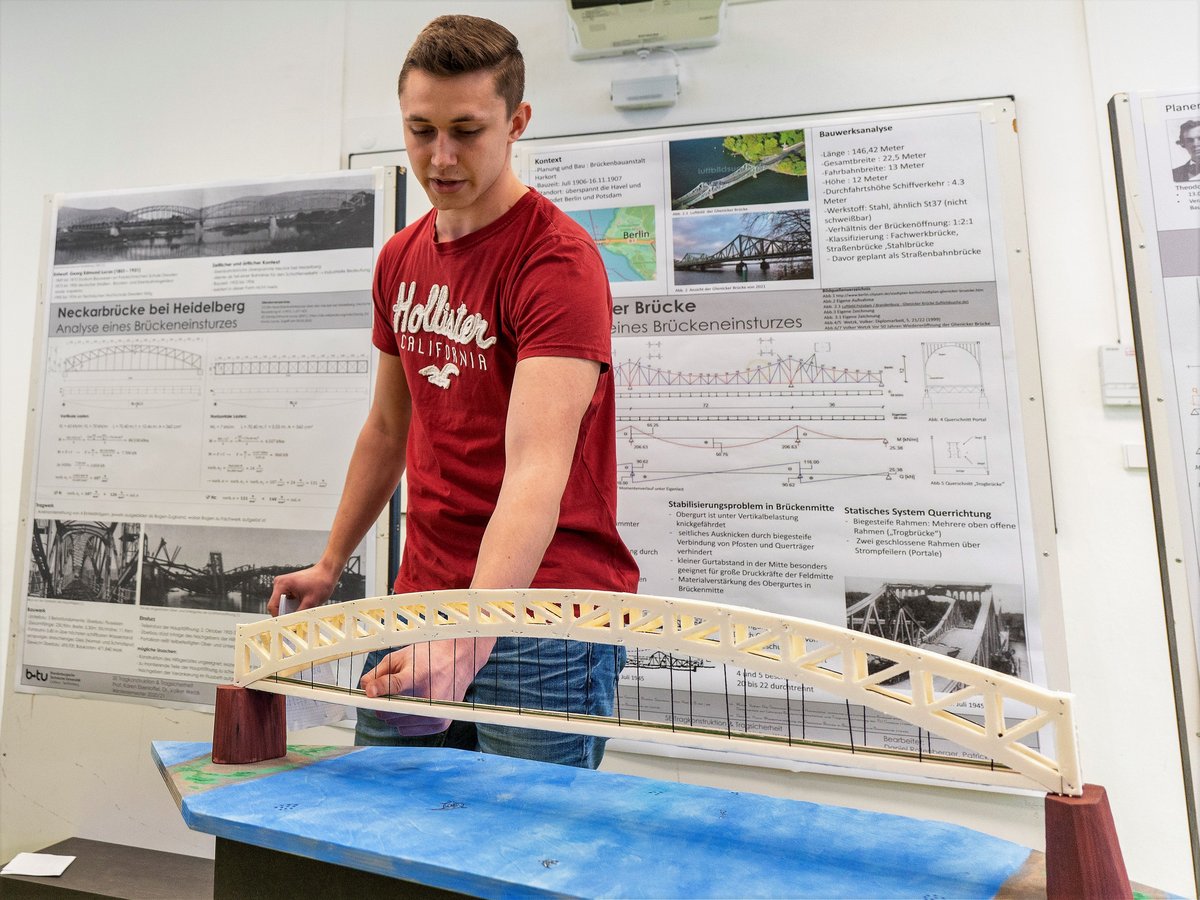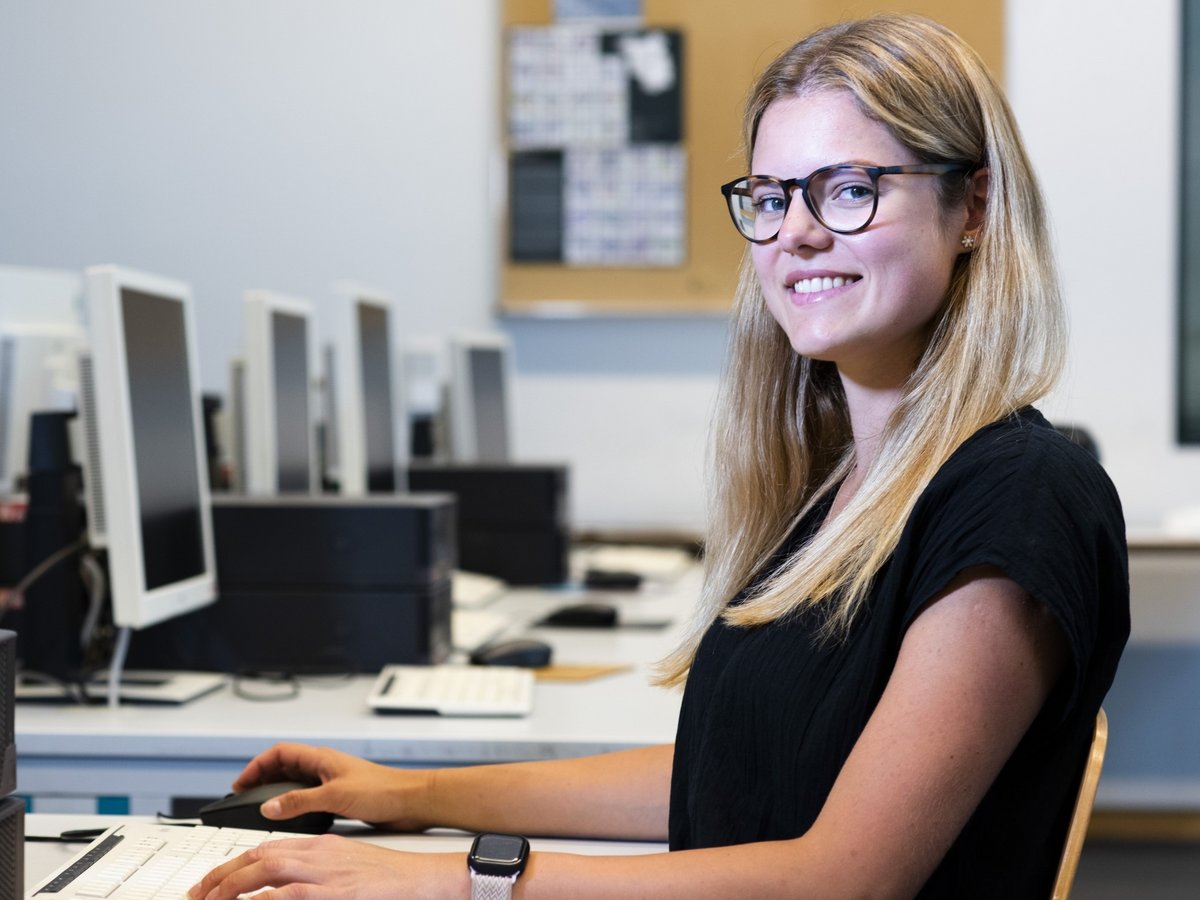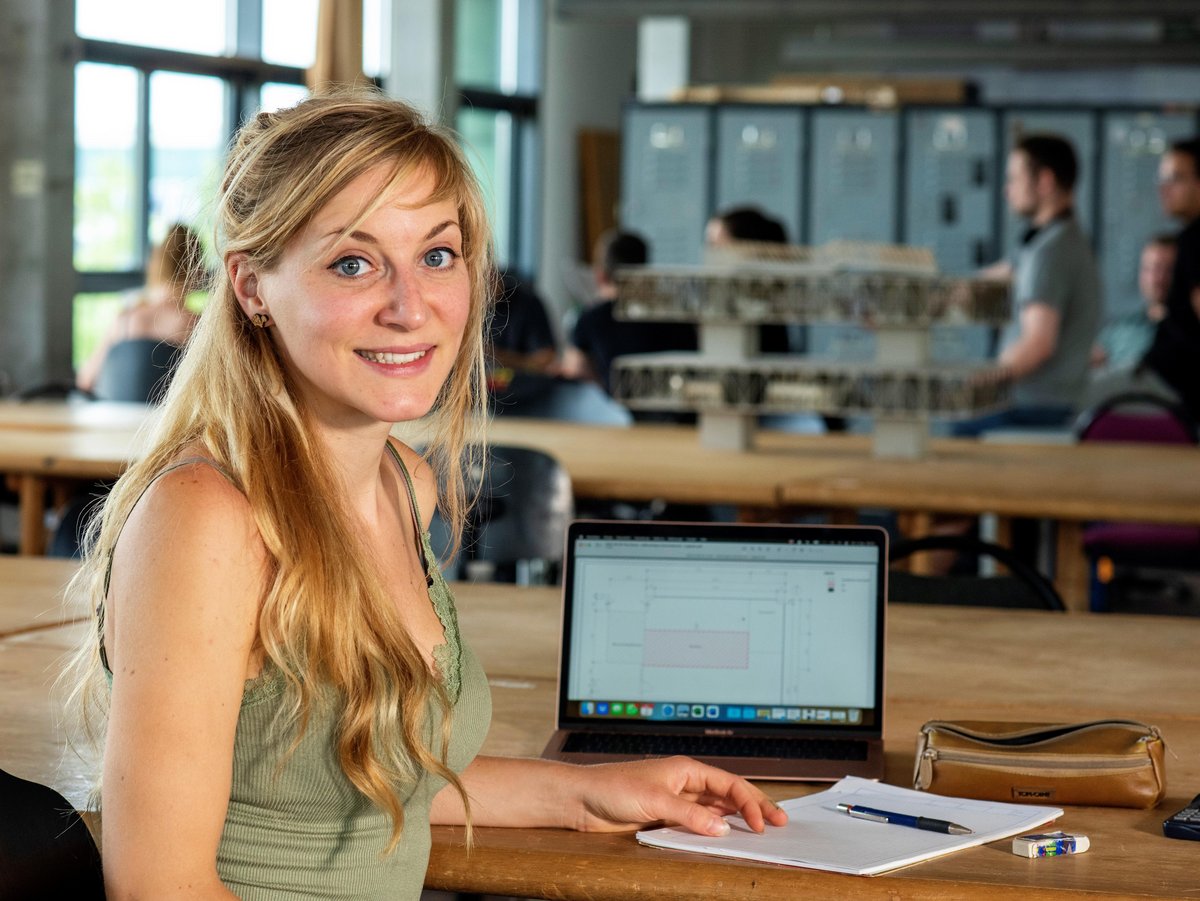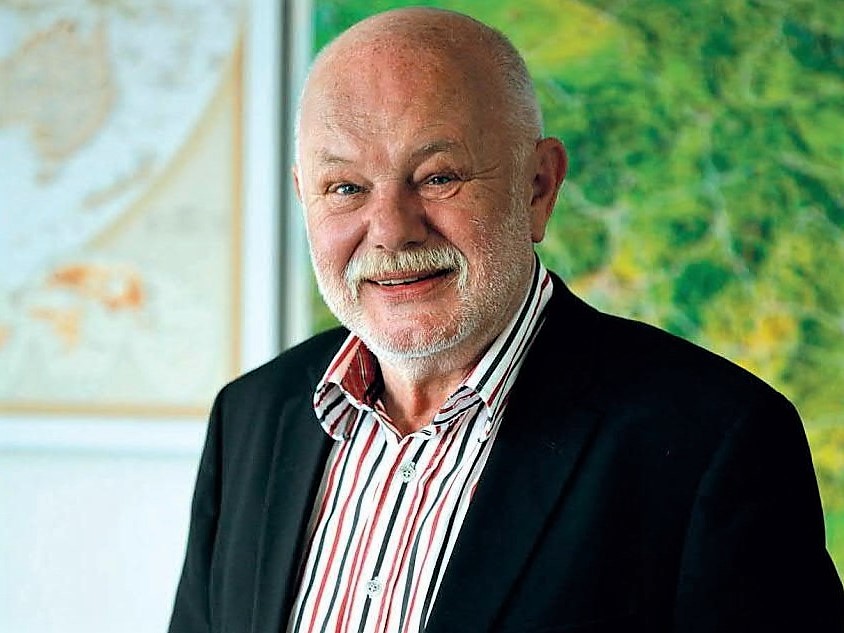"Studying civil engineering is a good investment in your own future"
Whether they want to construct bridges or high-rise buildings as future civil engineers, whether they want to test new types of construction, devote themselves to historical construction techniques or develop the technologies of tomorrow in research - studying civil engineering at the BTU prepares them in the best possible way. Interested students can still apply for the Master's programme until 31 August 2022 and for the Bachelor's programme until 26 September.
Master's student in civil engineering Julia Gebler explains: "One of the most important points for me, why I decided to continue my studies in the Master's programme at the BTU after my Bachelor's degree, was the almost familial interaction between students and teachers. Most of the lecturers are happy to take time for students' questions or personal problems. The supervision ratio at the BTU is often much better than at other universities, and in my experience, students often put an extra minute or two into supervising a thesis. Since many companies are suffering from the consequences of the generation change, you quickly get the opportunity to take up a working student position. In addition, the good and affordable residential environment speaks in favour of studying at the BTU, and with the semester ticket, you can quickly get to Berlin, Dresden or elsewhere."
Studying civil engineering at the BTU offers opportunities for professional profiling that are hard to find at any other university: First of all, students can choose between a six- or eight-semester Bachelor's degree and thus influence the degree of their professional qualification themselves. Those who also value financial independence and a pronounced practical orientation are welcome to study dual courses with a company of their choice.
In the first two years of study, the basics of civil engineering are taught, with special project modules accompanying the teaching of the material from the beginning and as a central didactic instrument. In these, the students deepen various lecture hall topics in the laboratory, studio or in selected existing buildings and learn, for example, to "grasp" building constructions in the truest sense of the word. From the 5th semester onwards, students have the opportunity to deepen their studies on their own responsibility and according to their preferences - some like topics in civil engineering or traffic route construction, others topics in structural engineering, such as steel or timber construction. Others are enthusiastic about aspects of construction economics or building or urban engineering. And in keeping with the motto "The future needs a past", the history of construction has been part of the compulsory canon for prospective civil engineers since the founding of the BTU - another important unique selling point of the degree programme led by Prof. Dr.-Ing. Carlos Grandas Tavera. Incidentally, the degree programme is also available on a part-time basis in case of private constraints.
Graduates of the admission-free Bachelor's degree programme in Civil Engineering find exciting professional fieldsof activity in engineering offices, construction companies or public authorities, in real estate and project development companies or in testing institutes and research institutions. The Bachelor of Science degree also opens up access to further Master's degree programmes such as civil engineering or climate-friendly construction and operation.
Opinions on studying civil engineering at the BTU:
Julia Werk, dual student
"For me personally, the advantages of the (dual) study programme in civil engineering at the BTU lie clearly in the pronounced practical relevance. Practical modules provide a project for each semester, in which experience in professional practice can be gained outside the lecture hall. They round off the technical and theoretical studies. The practical phases in the training company, which take place in the dual study programme during the semester breaks, offer both students and companies great opportunities to grow together and connect young people with future employers already during the training phase. Furthermore, the communication between the company and the university ensures that the students' performance meets the requirements of both working life and studying."
Fabian Fohler, graduate, academic employee
"The Bachelor's degree programme enabled me to enter professional practice as early as the third semester. In particular, the free work on the semester-long projects gave me important tools at an early stage to gain practical experience in an engineering office.
Equally many freedoms have arisen in the Master's in Civil Engineering, in which every student can pursue their own interests and profile themselves individually. Due to the many, individually selectable specialisation options, no course of study is comparable to another. My recently completed Master's degree opened up a job for me as an academic assistant at the Chair of Construction Mechanics and Numerical Methods at BTU."
Dr Dieter Werner, graduate, managing partner and entrepreneur
"I studied civil engineering at the former Cottbus Engineering College and received my doctorate in structural engineering in 1982. Studying civil engineering is a good investment in your own future.
As managing partner and entrepreneur, I have been guiding the fortunes of ARCUS Planung + Beratung Bauplanungsgesellschaft mbH and various subsidiaries for more than three decades. Our expertise lies in industrial and power plant construction, but now also in process engineering for CO2-free energy production. In addition, we plan administrative buildings and buildings in public spaces. We are a partner of the BTU by offering dual study places and supporting the Deutschlandstipendium."
History
Civil engineering is considered the "nucleus" of the university location in Cottbus and goes back to the year 1948, when initially a state building school was founded. Soon after, the College of Civil Engineering was founded, which closed again in the early 1960s due to a lack of party conformity. In 1969, it was re-established as the College of Civil Engineering on the grounds of the former educational centre, now the central campus of the BTU. Renamed the Cottbus College of Civil Engineering in October 1989, it formed the basis for the Cottbus University of Technology, which was founded in 1991 and renamed the Brandenburg University of Technology Cottbus in 1995. From the very beginning, civil engineering has been one of the study programmes that have shaped the university's profile.
Another innovative civil engineering course was initially established at the Senftenberg site of the Lausitz University of Applied Sciences, which was also founded in 1991 and renamed Lausitz University of Applied Sciences in 2009. This took over the properties of the Senftenberg School of Engineering for Mining and Energy, which was founded in 1947 as the Senftenberg School of Mining Engineering. The first prospective civil engineers began their studies in 1992. In the winter semester of 1995/96, the course moved to the new Cottbus-Sachsendorf campus.
Under the motto "LEARNING GOOD CONSTRUCTION", the BTU Cottbus and the Lausitz University of Applied Sciences founded the David Gilly Institute for Teaching, Research and Communication in Civil Engineering as a joint academic institution in 2011. Under its umbrella, two coordinated study programmes in civil engineering were offered, which mutually utilised synergies: a more research-oriented programme leading to a Bachelor of Science degree at BTU Cottbus and a more practice-oriented programme leading to a Bachelor of Engineering degree at Lausitz University of Applied Sciences.
The reestablishment of the Brandenburg University of Technology Cottbus-Senftenberg (BTU) through the merger of BTU Cottbus and Lausitz University of Applied Sciences in 2013 gave rise to the need to adapt the content and structure of the civil engineering degree programme to the requirements of today's professional field. The degree programme concept outlined above, with its two different durations and dual supplements, has since been successfully implemented.
In the meantime, a number of young professors from the Institute of Civil Engineering have brought a breath of fresh air into the lecture halls, and further appointments are due very soon. The number of new Bachelor's students has stabilised at a good level with about 65 new students per year.
Anyone who would like to find out more is invited to the central campus of the BTU in Cottbus on Friday, 16 September, for a look behind the scenes of the civil engineering degree programme. Dr.-Ing. Volker Wetzk, T 0355 69 3034, E volker.wetzk@b-tu.de, is happy to receive registrations.
Further information: https://www.b-tu.de/en/bauingenieurwesen-bs/
Contact
Press contact
Stabsstelle Kommunikation und Marketing
T +49 (0) 3573 85-283
ralf-peter.witzmann(at)b-tu.de




